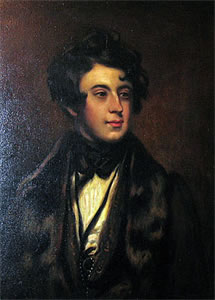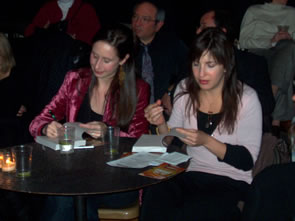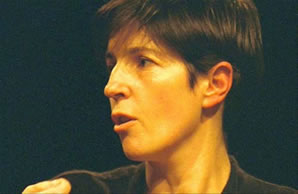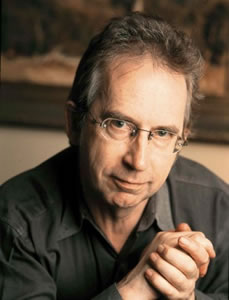De Engelse schrijver Charles Dickens werd geboren op 7 februari 1812 in Landport. Zie ook mijn blog van 7 februari 2007 en ook mijn blog van 7 februari 2008.
Uit: A Tale of Two Cities
“The stone faces on the outer walls stared blindly at the black night for three heavy hours; for three heavy hours the horses in the stables rattled at their racks, the dogs barked, and the owl made a noise with very little resemblance in it to the noise conventionally assigned to the owl by men-poets. But it is the obstinate custom of such creatures hardly ever to say what is set down for them.
For three heavy hours, the stone faces of the chateau, lion and human, stared blindly at the night. Dead darkness lay on all the landscape, dead darkness added its own hush to the hushing dust on all the roads. The burial-place had got to the pass that its little heaps of poor grass were undistinguishable from one another; the figure on the Cross might have come down, for anything that could be seen of it. In the village, taxers and taxed were fast asleep. Dreaming, perhaps, of banquets, as the starved usually do, and of ease and rest, as the driven slave and the yoked ox may, its lean inhabitants slept soundly, and were fed and freed.
The fountain in the village flowed unseen and unheard, and the fountain at the chateau dropped unseen and unheard – both melting away, like the minutes that were falling from the spring of Time – through three dark hours. Then, the grey water of both began to be ghostly in the light, and the eyes of the stone faces of the chateau were opened.
Lighter and lighter, until at last the sun touched the tops of the still trees, and poured its radiance over the hill. In the glow, the water of the chateau fountain seemed to turn to blood, and the stone faces crimsoned. The carol of the birds was loud and high, and, on the weather-beaten sill of the great window of the bedchamber of Monsieur the Marquis, one little bird sang its sweetest song with all its might. At this, the nearest stone face seemed to stare amazed, and, with opened mouth and dropped under-jaw, looked awe-stricken.“

Charles Dickens (7 februari 1812 – 9 juni 1870)
Portret door Samuel Drummond
De Amerikaanse schrijfster Emma Lanier McLaughlin werd geboren op 7 februari 1974 in Elmira, New York. Op de universiteit raakte zij bevriend met Nicola Kraus en samen schreven zij he Nanny Diaries. In Amerika was Dagboek van een nanny een enorm succes: er werden binnen vier maanden meer dan 500.000 exemplaren verkocht en het boek prijkte maandenlang op de bestsellerlijsten van The New York Times en Publishers Weekly. In 2004 verscheen Citizen Girl, in 2007 Dedication.
Uit: The Nanny Diaries
„The dark vestibule, wallpapered in some gloomy Colefax and Fowler floral, always contains a brass umbrella stand, a horse print, and a mirror, wherein I do one last swift check of my appearance. I seem to have grown stains on my skirt during the train ride from school, but otherwise I’m pulled together–twin set, floral skirt, and some Gucci-knockoff sandals I bought in the Village. She is always tiny. Her hair is always straight and thin; she always seems to be inhaling and never exhaling. She is always wearing expensive khaki pants, Chanel ballet flats, a French striped Tshirt, and a white cardigan. Possibly some discreet pearls. In seven years and umpteen interviews the I’m-mom-casu
al-in-my-khakis-but-intimidating-in-my-
$400-shoes outfit never changes. And it is simply impossible to imagine her doing anything so undignified as what was required to get her pregnant in the first place.
Her eyes go directly to the splot on my skirt. I blush. I haven’t even opened my mouth and already I’m behind.
She ushers me into the front hall, an open space with a gleaming marble floor and mushroom-gray walls. In the middle is a round table with“

Emma McLaughlin (Elmira, 7 februari 1974)
Emma McLaughlin and Nicola Kraus
De Franse schrijfster Christine Angot werd geboren op 7 februari 1959 in Châteauroux. Zij is er om bekend dat zij in haar boeken op soms schokkende en niets ontziende wijze persoonlijke ervaringen verwerkt. De kritiek is dan ook verdeeld: de een prijst haar directheid, de ander verwijt haar exibitionisme.
Uit: Le Marché des Amants
„Marc était chaleureux et sympathique, il avait envie de rapports intimes, tout en étant réservé il aimait parler. C’était un intellectuel de la rive gauche, décontracté, rieur, pas très grand, petites lunettes pour lire qu’il posait sur le bout du nez au lieu de les mettre et de les enlever, il lisait la carte au restaurant puis levait les yeux par-dessus pour vous parler. Il avait une voiture pour les longues distances, un scooter pour aller d’un rendez-vous à un autre en évitant les encombrements, un vélo parce qu’il aimait ça: sa pensée restait active, pendant qu’il se déplaçait à un rythme tranquille, en silence, il réfléchissait. Il aimait faire le marché, la cuisine aussi. Les cèpes. De temps en temps un très bon restaurant. Il aimait bien. Il s’occupait de ses enfants, même s’il les voyait peu, il était séparé de leur mère depuis trois ans. Il travaillait beaucoup. Il avait toujours beaucoup travaillé. Il faisait une belle carrière, il avait un bon salaire. Il habitait dans le quartier de Paris qui correspondait à ses centres d’intérêt, et lui permettait en même temps d’avoir une vie de famille. Le quatorzième. Le travail, l’école, les lieux de rendez-vous étaient proches les uns des autres. Il lisait beaucoup, allait au cinéma une fois par semaine, de temps en temps au spectacle. Il recevait les invitations mais évitait les premières, il était rédacteur en chef d’un journal culturel, si parfois il y allait, c’était pour gagner du temps, ça évitait d’avoir à réserver soi-même, c’était tout. D’un point de vue social ce genre de sortie lui déplaisait. Il critiquait ce milieu, cette ambiance tout en disant «m’enfin on va pas parler de ça». Il préférait voir sa vie en dehors de «cette espèce de zoo», il était contraint de s’y mêler, de très loin et en observateur, mais ne se sentait pas sali, pas touché. »

Christine Angot (Châteauroux, 7 februari 1959)
De Poolse dichteres Anna Świrszczyńska werd geboren op 7 februari 1909 in Warszawa. Zij begon met het publiceren van gedichten in de jaren dertig. Tijdens de bezetting van Polen gedurende WO II zat zij in het verzet, tijdens de opstand van Warschau was zij militair verpleegster. De beroemde dichter en vertaler Czesław Miłosz vertaalde later werk van haar naar het Engels.
The Second Madrigal
A night of love
exquisite as a
concert from old Venice
played on exquisite instruments.
Healthy as a
buttock of a little angel.
Wise as an
anthill.
Garish as air
blown into a trumpet.
Abundant as the reign
of a royal Negro couple
seated on two thrones
cast in gold.
A night of love with you,
a big baroque battle
and two victories.
In een blauwe pyjama
Ik slaap in een blauwe pyjama,
rechts van mij slaapt mijn kind.
Ik heb nooit gehuild,
ik zal nooit sterven.
Ik slaap in een blauwe pyjama,
links van mij slaapt mijn man.
Ik heb mijn hoofd nooit tegen de muur geslagen,
ik heb het nooit uitgegild van angst.
Hoe breed is dit bed niet
dat er plaats is
voor zoveel geluk
Vertaald door Jo Govaerts en Karol Lesman

Anna Świrszczyńska (7 februari 1909 – 14 augustus 2004)
De Australische schrijver Peter Carey werd geboren op 7 februari 1943 in Bacchus Marsh (Victoria). Zie ook mijn blog van 7 februari 2007 en ook mijn blog van 7 februari 2008.
Uit: His Illegal Self
„There were no photographs of the boy’s father in the house upstate. He had been persona non grata since Christmas 1964, six months before the boy was born. There were plenty of pictures of his mom. There she was with short blond hair, her eyes so white against her tan. And that was her also, with black hair, not even a sister to the blonde girl, although maybe they shared a kind of bright attention.
She was an actress like her grandma, it was said. She could change herself into anyone. The boy had no reason to disbelieve this, not having seen his mother since the age of two. She was the prodigal daughter, the damaged saint, like the icon that Grandpa once brought back from Athens—shining silver, musky incense—although no one had ever told the boy how his mother smelled.
Then, when the boy was almost eight, a woman stepped out of the elevator into the apartment on East Sixty-second Street and he recognized her straightaway. No one had told him to expect it.
That was pretty typical of growing
up with Grandma Selkirk. You were some kind of lovely insect, expected to know things through your feelers, by the kaleidoscope patterns in the others’ eyes. No one would dream of saying, Here is your mother returned to you. Instead his grandma told him to put on his sweater. She collected her purse, found her keys and then all three of them walked down to Bloomingdale’s as if it were a deli.“

Peter Carey (Bacchus Marsh, 7 februari 1943)
De Amerikaanse schrijver en journalist Gay Talese werd geboren op 7 februari 1932 in Ocean City. Zie ook mijn blog van 7 februari 2008.
Uit: A writer’s life
“I am not now, nor have I ever been, fond of the game of soccer. Part of the reason is probably attributable to my age and the fact that when I was growing up along the southern shore of New Jersey a half century ago, the sport was virtually unknown to Americans, except to those of foreign birth. And even though my father was foreign-born—he was a dandified but dour custom tailor from a Calabrian village in southern Italy who became a United States citizen in the mid-1920s—his references to me about soccer were associated with his boyhood conflicts over the game, and his desire to play it in the afternoons with his school friends in an Italian courtyard instead of merely watching it being played as he sat sewing at the rear window of the nearby shop to which he was apprenticed; yet, as he often reminded me, he knew even then that these young male performers (including his less dutiful brothers and cousins) were wasting their time and their future lives as they kicked the ball back and forth when they should have been learning a worthy craft and anticipating the high cost of a ticket to immigrant prosperity in America! But no, he continued in his tireless way of warning me, they idled away their afternoons playing soccer in the courtyard as they would later play it behind the barbed wire of the Allied prisoner of war camp in North Africa to which they were sent (they who were not killed or crippled in combat) following their surrender in 1942 as infantrymen in Mussolini’s losing army. Occasionally they sent letters to my father describing their confinement; and one day near the end of World War II he put aside the mail and told me in a tone of voice that I prefer to believe was more sad than sarcastic, “They’re still playing soccer!”

Gay Talese (Ocean City, 7 februari 1932)
De Duitse schrijver Alban Nikolai Herbst (pseudoniem van Alexander Michael v. Ribbentrop) werd geboren op 7 februari 1955 in Refrath. Zie ook mijn blog van 7 februari 2007 en ook mijn blog van 7 februari 2008.
Uit: Meere
„“Irenes Stolz. Der glühte wie eine Grundierung in ihrem ägyptischen Blick. Der gab ihr die Haltung, wenn sie sich schminkte. Immer saß er gerne dabei, saß auf dem Toilettendeckel und schaute ihr bewundernd zu. Was sie gar nicht schätzte. Bitte, Fichte, laß mich allein. Sie war so intim dann, so grenzenlos selbstbewußt, selbstverliebt; selbst wenn sie masturbierte, war sie nicht inniger mit sich als in solchen Momenten …”

Alban Nikolai Herbst (Refrath, 7 februari 1955)
De Nederlandse dichter en schrijver A. den Doolaard werd geboren op 7 febrauri 1901 in Hoenderloo. Zie ook mijn blog van 7 februari 2007 en ook mijn blog van 7 februari 2008.
Uit: Wampie. De roman van een zorgeloze zomer
„Wampie werd wakker.
Er zijn mensen wier ogen opengaan net zo snel als een deur wanneer er hard aan getrokken wordt: zo zie je niets, en dan opeens het hele binnenste van het huis. Hun hoofd lijkt het kastje van een kiektoestel: eerst is er niets dan het gladde rustige slapen, altoos eender, net als het gladde doffe overtrek van het kiekkastje. Maar dan wordt er plotseling op een geheimzinnig veertje gedrukt, en het glanzende oog, dat diep binnenin sliep, schiet met een ruk naar voren en kijkt je groot aan.
Maar zo ontwaakte Wampie nooit. Haar wakkerworden leek meer op het langzame neerdwarrelen van een blaadje van tak tot tak en dan in glijvlucht naar de grond. Want opstaan deed Wampie nooit: ze viel altijd
uit bed. Wanneer ze voelde dat ze wakker moest worden, omdat de wekker twee keer afgelopen en er drie keer op haar deur gebonsd was (een keer door haar zusje, een keer door moeder en een slotbons van vader, die bonst zoals alleen een man bonzen kan, die haastig naar kantoor moet, en dan zijn ganse ergernis over de afgelopen en komende vier en twintig uur, plus over het feit, dat hij een geliefde maar ogenschijnlijk luie dochter heeft, in één machtige bons ontlaadt) – dan, door die slag wanhopig losgeschud uit de boom harer dromen, die nog tussen de sterren doorgroeide hoewel het allang dag was, dwarrelde ze naar omlaag“.

A. den Doolaard (7 februari 1901 – 26 juni 1994)
De Amerikaanse schrijver Harry Sinclair Lewis werd geboren in Sauk Centre op 7 februari 1885. Zie ook mijn blog van 7 februari 2007.
Uit: Main Street
““Carol was discovering that the one thing that can be more disconcerting than intelligent hatred is demanding love. “She supposed that she was being gracefully dull and standardized in the Smails’ presence, but they scented the heretic, and with forward-stooping delight they sat and tried to drag out her ludicrous concepts for their amusement. They were like the Sunday-afternoon mob starting [sic] at monkeys in the Zoo, poking fingers and making faces and giggling at the resentment of he more dignified race…. They were staggered to learn that a real tangible person, living in Minnesota, and married to their own flesh-and-blood relation, could apparently believe that divorce may not always be immoral; thatÊ illegitimate children do not bear any special and guaranteed form of curse; that there are ethical authorities outside of the Hebrew Bible; that men have drunk wine yet not died in the gutter; that the capitalistic system of distribution and the Baptist wedding-ceremony were not known in the Garden of Eden; … that there are Ministers of the Gospel who accept evolution; that some persons of intelligence and business ability do not always vote the Republican ticket straight; … that a violin is not inherently more immoral than a chapel organ… ‘Where does she get all them the’ries?’ marveled Uncle Whittier Smail…”

Harry Sinclair Lewis (7 februari 1885 – 10 januari 1951)
Zie voor nog meer schrijvers van de 7e februari ook mijn vorige blog van vandaag.
